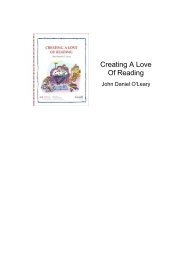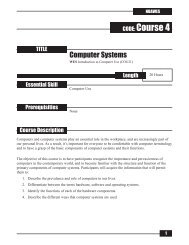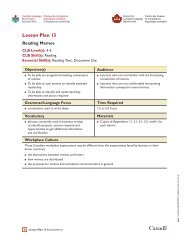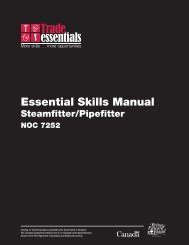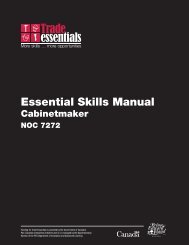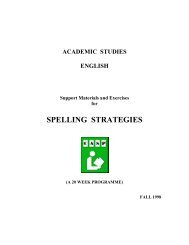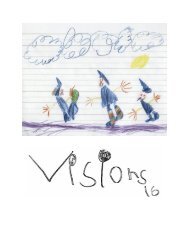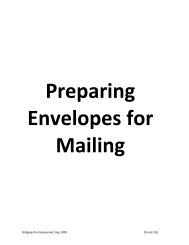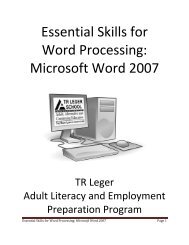Essential Skills - National Adult Literacy Database
Essential Skills - National Adult Literacy Database
Essential Skills - National Adult Literacy Database
Create successful ePaper yourself
Turn your PDF publications into a flip-book with our unique Google optimized e-Paper software.
Slide<br />
07<br />
Slide<br />
08<br />
Slide<br />
09<br />
<strong>Essential</strong> <strong>Skills</strong> and the Northern Oil and Gas Workforce Final Report and Resource Guide<br />
INUVIALUIT<br />
REGIONAL<br />
CORPORATIO<br />
N<br />
INUVIALUIT<br />
REGIONAL<br />
CORPORATIO<br />
N<br />
INUVIALUIT<br />
REGIONAL<br />
CORPORATIO<br />
N<br />
Phase 1 - Orientation<br />
2-day orientation to program<br />
• Program candidates will learn about program:<br />
– Purpose<br />
– Components<br />
– Content<br />
– Delivery modes<br />
– Intended outcomes<br />
• Expectations and responsibilities clearly<br />
communicated<br />
• Contract signed by participant before<br />
progressing to Phase 2<br />
Phase 2 - Assessment<br />
Work Readiness<br />
• TOWES (Test of Workplace <strong>Essential</strong> <strong>Skills</strong>)<br />
Other Assessments<br />
• <strong>Literacy</strong>, aptitudes, interests<br />
• Learning abilities, disabilities, personal management<br />
• Physical evaluations, ie. dexterity, colour blindness,<br />
strength, substance abuse<br />
• Assessors culturally sensitive individuals<br />
• Those with physical, social, mental health issues<br />
offered interventions outside program<br />
Career Goal Setting<br />
• Participants assigned a Career Mentor<br />
• Access provided to resources such as HRSDC<br />
<strong>Essential</strong> <strong>Skills</strong> web site, sector council information,<br />
apprenticeship, regional opportunities and local<br />
market demands<br />
• Career Mentor guides participants on career goals<br />
and objectives<br />
Phase 3 – Individual<br />
Career Action Plan<br />
• Based on assessments and career path selected in<br />
Phase 2<br />
• Career Mentor assists with developing CAP, including<br />
identifying learning objectives using a competency<br />
skill development system<br />
• Career development strategies such as Guiding<br />
Circles (AHRDC) will be utilized<br />
• Phase 3 outcome - each participant will have a<br />
comprehensive plan outlining:<br />
– Learning/training needs<br />
– Specific plans for learning environment<br />
orientation, essential skills upgrading, postsecondary<br />
training, vocational/ apprenticeship<br />
training, personal and professional development,<br />
– Milestones and timelines<br />
Slide<br />
10<br />
Slide<br />
11<br />
Slide<br />
12<br />
INUVIALUIT<br />
REGIONAL<br />
CORPORATIO<br />
N<br />
INUVIALUIT<br />
REGIONAL<br />
CORPORATIO<br />
N<br />
INUVIALUIT<br />
REGIONAL<br />
CORPORATIO<br />
N<br />
Phase 4 – <strong>Essential</strong> <strong>Skills</strong><br />
Upgrading<br />
<strong>Essential</strong> <strong>Skills</strong><br />
• Offered to ensure success in the workplace<br />
• Training is modeled on TOWES problem set approach<br />
using real-world workplace documents and tasks<br />
• Directly covers workplace-based reading, document<br />
use and numeracy<br />
• Addressing individual needs according to a<br />
participant’s chosen occupation<br />
• Aligns with HRSDC essential skills profiles<br />
• Integrated within all program activities<br />
Learning to Learn<br />
• Compulsory sessions covering:<br />
– Time management, task organization and<br />
planning, study strategies, note taking, research<br />
skills, team work<br />
– One-on-one tutoring, mentoring provided<br />
Phase 5 – Streaming<br />
Preparing for work<br />
• Employability skills and workplace environment<br />
training such as:<br />
– Workplace habits<br />
– Nature of work<br />
– Punctuality and absenteeism<br />
– Self-management<br />
• Career preparation training such as:<br />
– Pre-trades<br />
– Health and safety<br />
– Computer training<br />
Job shadowing<br />
• Job shadowing and short-term work experience<br />
opportunities also possible in this phase to practice<br />
employability and workplace environment skills<br />
Phase 6 – Work Practicum<br />
Workplace Mentor<br />
• Participants each assigned a workplace mentor<br />
(preferably Aboriginal) in their goal occupation<br />
Employer/Mentor Training<br />
• Training provided to workplace employees involved in<br />
program covering:<br />
– program overview, roles and responsibilities,<br />
Aboriginal cultural awareness, mentorship training<br />
Work Practicum Coordinator<br />
• A coordinator will liaise with employers to ensure all<br />
parties meet their obligations<br />
Linkage Model<br />
• Entrepreneurship training will be offered to<br />
participants interested in self-employment<br />
• Linkage model integrates business skills, essential<br />
skills, design skills, and problem solving skills<br />
W W<br />
37




